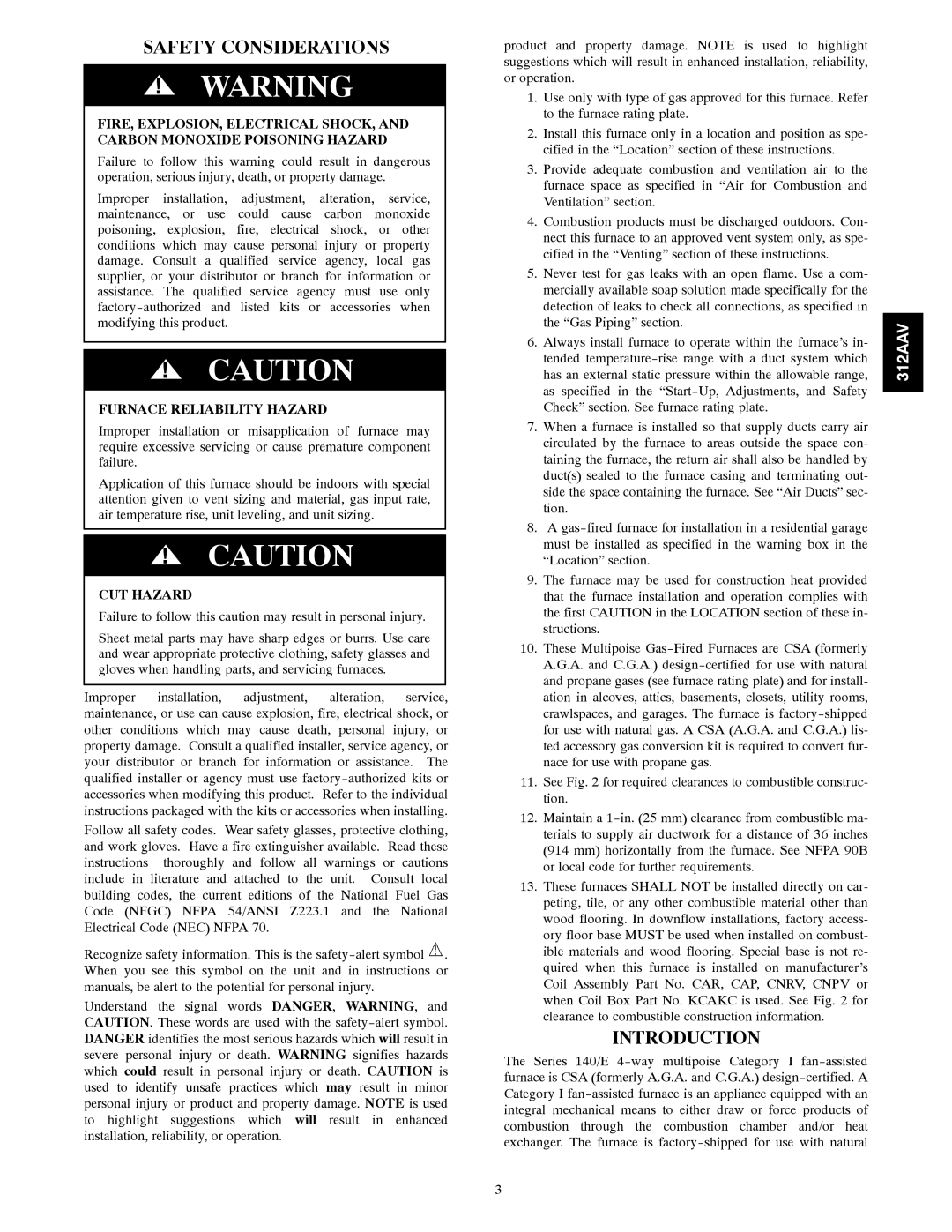SAFETY CONSIDERATIONS
!WARNING
FIRE, EXPLOSION, ELECTRICAL SHOCK, AND CARBON MONOXIDE POISONING HAZARD
Failure to follow this warning could result in dangerous operation, serious injury, death, or property damage.
Improper installation, adjustment, alteration, service, maintenance, or use could cause carbon monoxide poisoning, explosion, fire, electrical shock, or other conditions which may cause personal injury or property damage. Consult a qualified service agency, local gas supplier, or your distributor or branch for information or assistance. The qualified service agency must use only factory-authorized and listed kits or accessories when modifying this product.
!CAUTION
FURNACE RELIABILITY HAZARD
Improper installation or misapplication of furnace may require excessive servicing or cause premature component failure.
Application of this furnace should be indoors with special attention given to vent sizing and material, gas input rate, air temperature rise, unit leveling, and unit sizing.
!CAUTION
CUT HAZARD
Failure to follow this caution may result in personal injury.
Sheet metal parts may have sharp edges or burrs. Use care and wear appropriate protective clothing, safety glasses and gloves when handling parts, and servicing furnaces.
Improper installation, adjustment, alteration, service, maintenance, or use can cause explosion, fire, electrical shock, or other conditions which may cause death, personal injury, or property damage. Consult a qualified installer, service agency, or your distributor or branch for information or assistance. The qualified installer or agency must use factory-authorized kits or accessories when modifying this product. Refer to the individual instructions packaged with the kits or accessories when installing.
Follow all safety codes. Wear safety glasses, protective clothing, and work gloves. Have a fire extinguisher available. Read these instructions thoroughly and follow all warnings or cautions include in literature and attached to the unit. Consult local building codes, the current editions of the National Fuel Gas Code (NFGC) NFPA 54/ANSI Z223.1 and the National Electrical Code (NEC) NFPA 70.
Recognize safety information. This is the safety-alert symbol  . When you see this symbol on the unit and in instructions or manuals, be alert to the potential for personal injury.
. When you see this symbol on the unit and in instructions or manuals, be alert to the potential for personal injury.
Understand the signal words DANGER, WARNING, and CAUTION. These words are used with the safety-alert symbol. DANGER identifies the most serious hazards which will result in severe personal injury or death. WARNING signifies hazards which could result in personal injury or death. CAUTION is used to identify unsafe practices which may result in minor personal injury or product and property damage. NOTE is used to highlight suggestions which will result in enhanced installation, reliability, or operation.
product and property damage. NOTE is used to highlight suggestions which will result in enhanced installation, reliability, or operation.
1.Use only with type of gas approved for this furnace. Refer to the furnace rating plate.
2.Install this furnace only in a location and position as spe- cified in the “Location” section of these instructions.
3.Provide adequate combustion and ventilation air to the furnace space as specified in “Air for Combustion and Ventilation” section.
4.Combustion products must be discharged outdoors. Con- nect this furnace to an approved vent system only, as spe- cified in the “Venting” section of these instructions.
5.Never test for gas leaks with an open flame. Use a com- mercially available soap solution made specifically for the detection of leaks to check all connections, as specified in the “Gas Piping” section.
6.Always install furnace to operate within the furnace’s in- tended temperature-rise range with a duct system which has an external static pressure within the allowable range, as specified in the “Start-Up, Adjustments, and Safety Check” section. See furnace rating plate.
7.When a furnace is installed so that supply ducts carry air circulated by the furnace to areas outside the space con- taining the furnace, the return air shall also be handled by duct(s) sealed to the furnace casing and terminating out- side the space containing the furnace. See “Air Ducts” sec- tion.
8.A gas-fired furnace for installation in a residential garage must be installed as specified in the warning box in the “Location” section.
9.The furnace may be used for construction heat provided that the furnace installation and operation complies with the first CAUTION in the LOCATION section of these in- structions.
10.These Multipoise Gas-Fired Furnaces are CSA (formerly A.G.A. and C.G.A.) design-certified for use with natural and propane gases (see furnace rating plate) and for install- ation in alcoves, attics, basements, closets, utility rooms, crawlspaces, and garages. The furnace is factory-shipped for use with natural gas. A CSA (A.G.A. and C.G.A.) lis- ted accessory gas conversion kit is required to convert fur- nace for use with propane gas.
11.See Fig. 2 for required clearances to combustible construc- tion.
12.Maintain a 1-in. (25 mm) clearance from combustible ma- terials to supply air ductwork for a distance of 36 inches (914 mm) horizontally from the furnace. See NFPA 90B or local code for further requirements.
13.These furnaces SHALL NOT be installed directly on car- peting, tile, or any other combustible material other than wood flooring. In downflow installations, factory access- ory floor base MUST be used when installed on combust- ible materials and wood flooring. Special base is not re- quired when this furnace is installed on manufacturer’s Coil Assembly Part No. CAR, CAP, CNRV, CNPV or when Coil Box Part No. KCAKC is used. See Fig. 2 for clearance to combustible construction information.
INTRODUCTION
The Series 140/E 4-way multipoise Category I fan-assisted furnace is CSA (formerly A.G.A. and C.G.A.) design-certified. A Category I fan-assisted furnace is an appliance equipped with an integral mechanical means to either draw or force products of combustion through the combustion chamber and/or heat exchanger. The furnace is factory-shipped for use with natural

